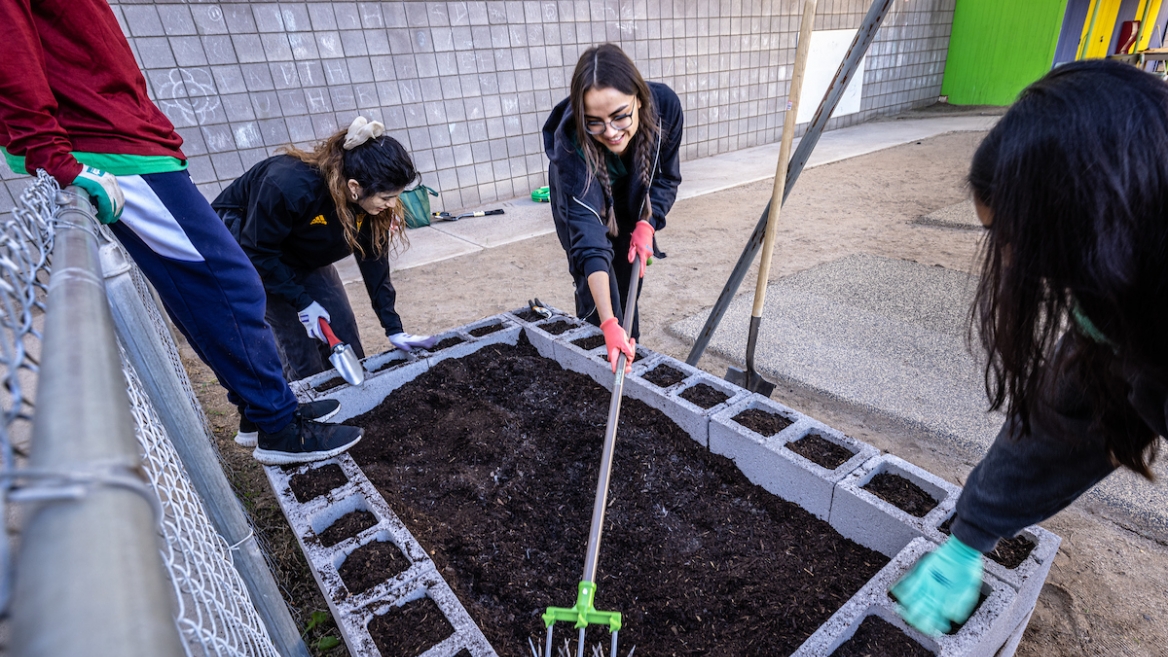
SAGE program plants gardens, educates children on healthy eating
By
—
It’s just past 7:30 a.m. when Nathan Ashok dons his pair of gloves, picks up a gray cinder block and smoothly places it a few feet away from the swing set.
As fellow Arizona State University students Joanna Carvallo and Anjali Patel grab more cinder blocks, Ashok begins to level the ground. In less than 45 minutes, the three students, along with program coordinator Joseline Jimenez, construct a 3-by-6 garden bed with eight bags of soil and 28 blocks at Faith Lutheran preschool near Seventh Street and Camelback Road.
If all goes well, the bed will become a flourishing garden of carrots, radishes and zucchini for the 44 children at the preschool, who in turn will get to enjoy the vegetables of their labor.
“Our hope is to have them explore new fruits and vegetables through the garden and also know the process of what it takes to grow something to eat,” said Alma Cortes, preschool director at Faith Lutheran. “Expose them to something they haven’t had in the past.”
That’s the goal of SAGE (Sustainability via Active Garden Education), an ASU project that over the last seven years has partnered with 40 Head Start and Child and Adult Care Food Program preschools to build open-air gardens and provide a curriculum that includes garden materials, lessons, video instruction and technical support.
Rebecca Lee, a professor in ASU’s Edson College of Nursing and Health Innovation and a senior global futures scientist in the Julie Ann Wrigley Global Futures laboratory, said SAGE grew out of a family of projects that started in Houston in 2010 with the goal of preventing and controlling obesity.
Lee, the SAGE principal investigator, said for that goal to be reached, education has to start early in a person’s life.
SAGE, which is funded by grants from the National Institutes of Health, identifies schools that fit the criteria for the gardens, plants the garden bed, gives the seeds to the school principal or director and then goes about educating the students.
The curriculum, which was designed in coordination with early-care teachers, understands the audience it’s trying to reach.
“We’re helping children learn about healthy food, where food comes from and physical activity,” Lee said. “We start out talking about fresh air and sunshine and adequate nutrition and water, and how you can grow big and strong.”
“Through the 12 sessions of the curriculum, (the children) have songs and games, there’s three science experiments and some small groups circle-time discussion. There’s a lot of material, and some of it is pretty redundant, but when you’re working with 3-, 4- and 5-year-olds, you need a lot of redundancy.”
SAGE also provides follow-up care if school officials have questions or need any technical support.
Lee said SAGE is staffed by undergraduate students, who receive anywhere from one to three credit hours, depending on their involvement, and master’s students who are doing field research. In addition, SAGE was recently awarded an AmeriCorps public health grant, so 20 AmeriCorps students will be working 10 to 20 hours a week on the project.
“There’s a lot going on,” Lee said with a laugh.
On this Friday morning, Carvallo, a biochemistry major with a minor in Spanish, Patel and Ashok, a science of health care delivery graduate student, are not thinking about the scope of the project. They’re making sure the garden bed is level, filling the top of the cinder blocks with soil and imagining the kids’ delight when the first carrots are pulled from the ground.
“This is my first time going out and planting the garden,” said Patel, who’s majoring in biomedical sciences and minoring in global health and human development. “I’m really excited. Honestly, I wish I had this kind of stuff when I was little. Gardening is such a fun activity to do, and the nutrition aspect I feel is really educational.”
But it’s the smile on the children’s faces — and the joy they get when they’re digging through the soil — that stays with Carvallo.
“They love to grow all the little plants,” she said.
Happiness. Nutrition. Education.
They’re what SAGE is all about.
Fourth-year biochemistry student Joana Carvallo rakes out the freshly spread garden soil as a group of ASU SAGE-affiliated students and the project coordinator assemble a raised garden for preschoolers on Friday, Oct. 28, at the Faith Lutheran Church in Phoenix. Photo by Charlie Leight/ASU News
